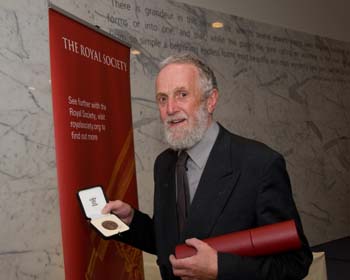Royal Society Award for "Unsung Hero" of Science

A senior technician at Lancaster University has received a Hauksbee Award from the Royal Society in recognition of his valuable role in supporting scientific research.
The award was presented to Ian Miller by Prince Edward, the Duke of Kent, at the Society’s London headquarters, where he received an engraved bronze medal, scroll and £500.
The ten new Hauksbee Awards – named after Isaac Newton’s assistant Francis Hauksbee – were created to recognise the “unsung heroes” of science labs, research institutions and schools who work behind the scenes to support the UK science base. The awards are being made as part of the Society’s 350th Anniversary celebrations this year.
Ian Miller said: “There would be no science for the Royal Society to honour if there weren’t technicians. The technicians are an important part of research and of all university life.”
Ian Miller is one of the world’s leading low temperature technicians, working in the Microkelvin Group in the Department of Physics at Lancaster University with Professor George Pickett FRS. Ian has a world-wide reputation for microkelvin technology. He has been unstinting in assisting other low temperature groups around the world by providing Lancaster experience and technology which can now be found productively operating across Europe, North America and the Middle East.
Professor Pickett said: “Having worked with Ian in just those few initial months, it became apparent he was brilliant at his job. He could do everything from building brick walls with his bare hands to machining to instrument-making quality. He soon learned all the tricks of low temperature physics.”
Professor Carol Robinson FRS, who chaired the Hauksbee Awards Committee, said the calibre of applications for the award had been very high.
“Without their dedication and enthusiasm our science classrooms and laboratories could not function properly. The skills they bring are invaluable. Science owes as much to them as it does to groundbreakers such as Isaac Newton, Charles Darwin and Stephen Hawking.”